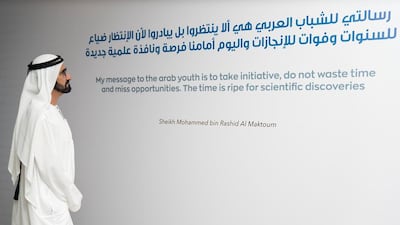For a society to be productive, healthy and happy, it is imperative to recognise and invest in its most promising asset, its future. Right now, young Arabs below the age of 25 constitute nearly half of the region’s population. By 2030, this number is projected to rise even further and a significant share of this young population will be working.
There is a growing need to invest in enabling youth to prepare for a fast-changing global workplace. This need was pre-empted by our visionary leader, Sheikh Mohammed bin Rashid, when he launched the One Million Arab Coders initiative last year.
The idea was simple – to empower a future generation of one million Arabs by providing them access to free software development training to futureproof their skills.
The widespread appeal for such an initiative has been evident from the results of the first two programme cohorts. Led by Dubai Future Foundation and powered by the world-class higher education platform Udacity, the initiative continues to see more students enrolling into the programme while additional tutors and partners have joined to support this growing community.
Promoting sustainable causes for the betterment of society is the founding principle of the Hussain Sajwani – Damac Foundation. We are proud to be strategic partners of the programme and are passionate advocates of the initiative, which offers a direct path to a prosperous future.
So far, the initiative has attracted more than one million interactions by more than 600,000 interested candidates from 194 countries. During the first and second cohort, 250,000 students have been admitted in this unprecedented initiative.
While the numbers are impressive, the more significant fact is the eagerness among the youth of this region to be part of the future. Students taking part in this initiative are less likely to drop out and more likely to stay on track, submitting projects on time, compared to other educational programmes running on Udacity’s global platform. As we begin to see the change that we had hoped to create through this initiative, it is imperative to recall what we set out to achieve, namely employment opportunities for today and tomorrow.
The ninth annual Arab Youth Survey, published last year, revealed some key insights into how the youth of the region perceive their future. While unemployment emerged as the biggest obstacle, the majority of youth outside the GCC believed their education system was not doing enough to prepare them for future jobs.
In the Arab world, two out of five graduates were unemployed. The One Million Arab Coders initiative offers a parallel education platform for Arab youth across the world to learn and prepare for the jobs of today and tomorrow and directly increases employment opportunities for them.
Currently only 13 per cent of the region's university graduates have degrees in subjects related to information technology. In a job market where the demand for IT professionals is constantly rising, this poses a real threat. The initiative’s primary objective is to provide the skills necessary to enable the region to thrive in a rapidly digitalising world.
Learning never stops; it is a lifelong process. The coders initiative encourages Arab youth to keep learning to better equip themselves for future disruption in technology and the job market. More than 60 per cent of candidates admitted to the programme are students who hold diplomas or higher education degrees. These are professionals who are striving to re-invent themselves and now have a platform to do so.
The Middle East and North Africa is utilising 30 per cent less of its female capacity than the global average. While women in the region are highly educated, their potential to contribute to the labour market has not been fully deployed. If the region is to grow in the coming years, enabling women to participate in the economy is of paramount importance.
The One Million Arab Coders initiative aims to create an inclusive platform for women in the region to equally partake in the making of a prosperous future. The results have been astounding. Women have shown keen interest in this initiative and currently represent 27 per cent of the students admitted. What is most interesting is that the majority of tutors who volunteered to teach in this initiative are also women. This is just the beginning of a sea change.
Today, the initiative has evolved into a global community that includes students who are opting to redefine themselves, tutors who are dedicating their time to help students learn and corporate institutions like ours that are investing their knowledge and resources towards the cause.
We urge all lifelong learners and teachers across the Arab world to join this revolution and drive the future of this world instead of merely adjusting to it.
Hussain Sajwani is the chairman of Damac Properties and the founder of the Hussain Sajwani – Damac Foundation

